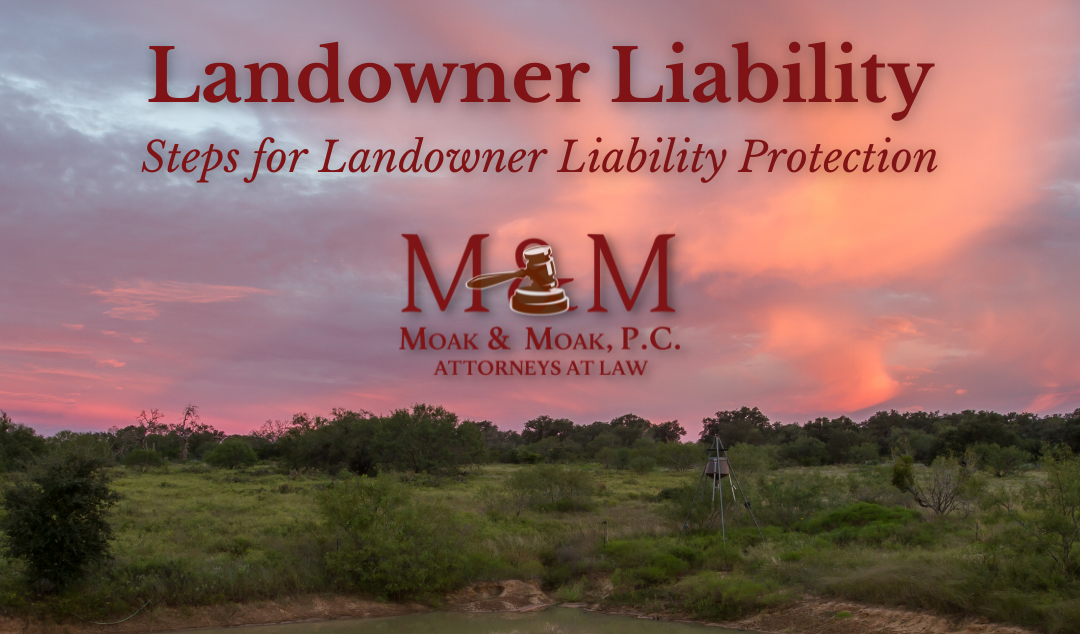By Sam A. Moak
In my last column, I discussed landowner liability. This week, I will discuss a few steps that should allow a landowner the best opportunity to avoid being held liable.
There are a number of steps for a landowner to consider in order to protect himself or herself from liability. Importantly, there is no magic solution that will ensure a landowner will never be liable for injury. Further, there is nothing a landowner can do to prevent a person from filing suit against the landowner.
Carry Liability Insurance
The most important step a landowner can take to protect his or her operation is to carry liability insurance. Every landowner needs to have a liability insurance policy covering every activity taking place on the property. For example, if a landowner has a farm and ranch policy for their cattle operation, but also conducts other activities like leasing the property for deer or bird hunting, the landowner should consult with their insurance agent to confirm the additional activities are covered.
The amount of insurance coverage depends on the activity happening on the property and the location. Landowners should consider the amount of risk associated with their operation. For example, a farm in northwest Texas (middle of nowhere) that does not host any sort of events or have any guests would likely need a lower coverage amount than a rancher in East Texas just North of Houston (populated area) that leases day hunts for deer or birds. Talking through the details of an operation with an insurance agent will allow a landowner to determine the right coverage level. You should also discuss the endorsements and exclusions that may be contained in your liability policy.
Identify Dangerous Conditions On the Land
As I pointed out in my earlier column, Landowner Liability, a landowner owes certain duties to a person on his or her property. Although a landowner is only required to conduct a reasonable inspection and make safe or warn of dangerous conditions for a guest, doing so for all persons may help to avoid an injury altogether. Landowners should think about their properties and seek to identify any potentially dangerous conditions. Once these conditions have been identified, landowners should take care to warn guests about them or to make them safe.
Obtain Written Liability Waivers
Liability waivers or releases, are simply documents signed by guests agreeing that they will not hold a landowner liable for injuries that occur on the property. Texas courts will generally enforce this type of waiver if drafted in a manner complying with Texas law.
Texas courts require liability waivers to be conspicuous and to comply with the express negligence doctrine. These requirements are in place in order to ensure a person signing a waiver has fair notice and understands what he or she is agreeing to.
The language required in liability waivers must meet very specific requirements and therefore you should consult an attorney when drafting them. Releases should identify the activity involved and common dangers. Again, seeking the professional help from an attorney when drafting them is recommended.
Consider Using a Business Entity Structure
Another way to limit potential liability exposure is to consider putting one’s land and/or assets into a business entity which offers limited liability. This would include a corporation, limited liability company, limited partnership or trust. These entities must be formed correctly and managed properly. Many people try to form such entities themselves and/or manage them improperly. Failing to do either correctly is fatal to the entity and the landowner would lose liability protection. Factors such as ease of creation, complexity of management and tax liability should all be considered. Therefore, this is another area to seek legal counsel and expertise. When formed and managed properly, these entities can provide limited liability for a landowner if someone gets injured on property owned by the entity.
Does a Limited Libabilty Statute Apply
Texas has three limited liability statutes: Recreational Use Statute, Texas Agritourism Statute and the Texas Farm Animal Liability Act. These statutes may apply depending on the activities the landowner is conducting on his or her property. However, each statute has its own specific requirements. For example, are fees charged, do the property taxes paid exceed the fees, adequate insurance coverage, and are signs required to be posted? Therefore the landowner must familiarize himself or herself with each statute’s requirements and consult with an attorney.
All landowners should be aware of the potential risk of liability if someone is injured on their property. A personal injury lawsuit can be difficult, time consuming, and expensive to defend. However, there are a number of steps that can be taken in order to prevent injuries from occurring in the first place and to limit potential exposure in the event one does occur. Consulting an attorney familiar with real estate and business entity law to help you in this area is very important.
The information in this column is not intended as legal advice but to provide a general understanding of the law. Any readers with a legal problem, including those whose questions are addressed here, should consult an attorney for advice on their particular circumstances.
Sam A. Moak is an attorney with the Huntsville law firm of Moak & Moak, P.C. He is licensed to practice in all fields of law by the Supreme Court of Texas, is a Member of the State Bar College, and is a member of the Real Estate, Probate and Trust Law Section of the State Bar of Texas.

